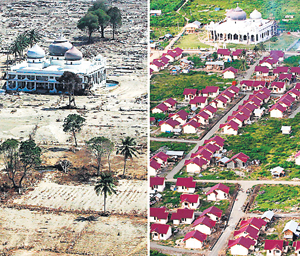
|
UN defends rebuilding efforts despite growing criticism UNITED NATIONS, (AP) - The U.N. deputy envoy for recovery from the 2004 Indian Ocean tsunami defended the efforts of aid workers to rebuild battered countries despite growing criticism that much of the US$14 billion (euro10.6 billion) in aid donations has been spent poorly. ''I think one can be encouraged by the progress that has taken place without being ignorant or wanting to ignore the overwhelming challenges ahead,'' Eric Schwartz said at a news conference. Schwartz, who presented a report issued by former U.S. President Bill Clinton, the top U.N. Envoy for tsunami recovery, acknowledged the effort has been a continual ''work in progress.''
''As much as we want to credit the progress that has taken place, not for a minute do I want to suggest that the challenges ahead aren't daunting,'' he said. ''The pressure on organizations to deliver assistance quickly to the needy and to spend donations without delay can be immense,'' the report said. ''But if handled poorly, these pressures can conflict with the equally important imperative to consult with those in need and to keep them up-to-date on and involved in assistance efforts on their behalf.'' Though Schwartz argued that US$12 billion (euro9.11 billion) in funding has been committed to recovery and reconstruction projects, critics claim that billions of aid dollars have been misappropriated, or simply not been disbursed, causing victims to live in crowded tent camps or temporary homes. Some survivors have said they are stuck with poorly built structures that leak, are termite-infested or located in flood zones. Corruption has also marred the process, with several nongovernment organizations forced to delay projects or rebuild homes after contractors and suppliers ran off with funding. Despite pitfalls the recovery workers have encountered, Schwartz pointed to the 150,000 homes that have been built, as well as 80,000 homes and hundreds of schools currently being constructed. The recovery effort, Schwartz said, has made a ''greater effort to ensure accountability'' than previous disasters, and noted that ''in some countries they've done very well, and in others they're still working out the kinks.'' Sri Lanka, according to Transparency International, a global anti-corruption watchdog, has been slow to set up the mechanisms to address these problems and, instead, has left monitoring of tsunami funds to international and local NGOs. Violence in Sri Lanka, Schwartz said, has also exacerbated the problems recovery workers encounter because aid is not easily distributed to victims in the North and Eastern areas of the country. |
| || Front
Page | News
| Editorial
| Columns
| Sports
| Plus
| Financial
Times | International
| Mirror
| TV
Times | Funday
Times || |
| |
Copyright
2006 Wijeya
Newspapers Ltd.Colombo. Sri Lanka. |
